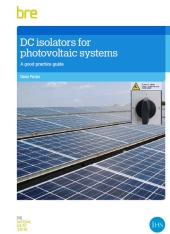DC isolators for photovoltaic systems (FB 68)
BRE (Building Research Establishment) is an independent, research-based consultancy, testing and training organisation, operating in the built environment and associated industries.
On 7 October 2014, BRE published DC isolators for photovoltaic systems (FB 68), by Steve Pester.
Photovoltaic (PV) power systems are becoming increasingly commonplace. But rapid expansion of the market brings with it a need to be vigilant in the maintenance of standards. Misunderstanding the details of the technology can prove dangerous.
DC isolators are a critical component for the safe design and installation of PV systems, and were made mandatory by the Wiring Regulations (BS 7671). But a lack of understanding has led to a few incidents of fire in UK installations. In most cases they are safe and reliable, but if they are incorrectly specified or installed isolators can cause fires. This 28 page guide explains the key points that should be taken into account when specifying DC isolators, including the standards and certifications required.
The guide describes the purpose, functions and features of isolators on PV systems as well as some of the available products. It explains some of the issues found in the field, with a rogues’ gallery of examples and reviews the relevant standards and guidance currently available
The contents of the guide include:
- Introduction.
- What is an isolator?
- Current issues and rogues’ gallery.
- AC and DC electricity.
- Typical PV systems.
- Types of DC isolator on the market.
- Specifying DC isolators for PV systems.
- Standards and certifications.
- Conclusions and recommendations.
- Appendix: Utilisation categories.
- References and further reading.
[edit] Find out more
[edit] Related articles on Designing Buildings Wiki
- Battery energy storage systems with grid-connected solar photovoltaics BR 514.
- BRE articles on Designing Buildings Wiki.
- BRE Buzz articles on Designing Buildings Wiki.
- BRE National Solar Centre.
- BRE photovoltaic certification scheme.
- Building Research Establishment.
- Code of practice for grid connected solar photovoltaic systems.
- Future of electricity in domestic buildings.
- Large scale solar thermal energy.
- Microgeneration.
- Micro-grid.
- Pavegen.
- PV inverter.
- Solar photovoltaics.
- Solar thermal systems.
- The Future of Electricity in Domestic Buildings.
Featured articles and news
Call for greater recognition of professional standards
Chartered bodies representing more than 1.5 million individuals have written to the UK Government.
Cutting carbon, cost and risk in estate management
Lessons from Cardiff Met’s “Halve the Half” initiative.
Inspiring the next generation to fulfil an electrified future
Technical Manager at ECA on the importance of engagement between industry and education.
Repairing historic stone and slate roofs
The need for a code of practice and technical advice note.
Environmental compliance; a checklist for 2026
Legislative changes, policy shifts, phased rollouts, and compliance updates to be aware of.
UKCW London to tackle sector’s most pressing issues
AI and skills development, ecology and the environment, policy and planning and more.
Managing building safety risks
Across an existing residential portfolio; a client's perspective.
ECA support for Gate Safe’s Safe School Gates Campaign.
Core construction skills explained
Preparing for a career in construction.
Retrofitting for resilience with the Leicester Resilience Hub
Community-serving facilities, enhanced as support and essential services for climate-related disruptions.
Some of the articles relating to water, here to browse. Any missing?
Recognisable Gothic characters, designed to dramatically spout water away from buildings.
A case study and a warning to would-be developers
Creating four dwellings... after half a century of doing this job, why, oh why, is it so difficult?
Reform of the fire engineering profession
Fire Engineers Advisory Panel: Authoritative Statement, reactions and next steps.
Restoration and renewal of the Palace of Westminster
A complex project of cultural significance from full decant to EMI, opportunities and a potential a way forward.
Apprenticeships and the responsibility we share
Perspectives from the CIOB President as National Apprentice Week comes to a close.
























Comments